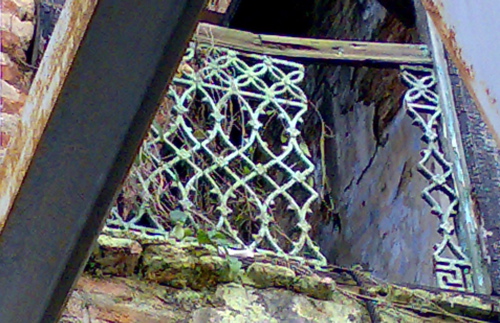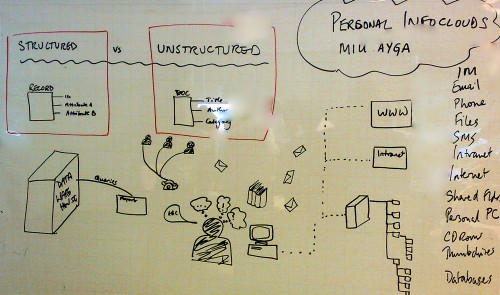Dec 05
Wiki Intranet 2.0
Hurry on over to the e-gineer blog where Nathan Wallace has posted an update on his spectacular wiki-intranet project at Janssen-Cilag. In this post he’s looking much more at the information issues and the impact on information and knowledge culture – including, interestingly, a siphoning off of activity from the dreaded multi-headed email beast. Here are a couple of tasters:
“There are three critical information flows, each of which creates its own stock over time:
The flow of news becomes a stock of facts and decisions.
The flow of projects becomes a stock of investigations and outcomes.
The flow of ideas becomes a stock of potential and experts.”
...
“Shamelessly stealing from the Agile Manifesto, I propose the following values for building Enterprise 2.0 collaboration systems:
Individuals and interactions over processes and tools.
Ease of use over comprehensive training.
Flexible tools over completeness.
Responding to needs over creating demand.
(That is, while there is value in the items on the right, we value the items on the left more.)”
Thanks to James Robertson for the heads up on this.
Dec 04
The Enterprise Search Ecosystem
Jayne Dutra has posted a report on Free Pint giving the most sensible overview I’ve seen of the direction Enterprise Search is going in – an ecosystem of tools and methods (including taxonomies), bound together by metadata, and serving a variety of information environments (or information neighbourhoods as I call them). Here are a couple of quotes:
“Enterprise search is no longer a one-size-fits-all problem. Information retrieval is a complex area that is being increasingly seen as task dependent. In other words, how and why a user searches is directly related to what type of activity he is engaged in. Therefore search solutions must be designed around specific business problems that provide meaningful value to the enterprise. ”
...
“The ultimate goal is an information environment enhanced by metadata and served up through a number of rich user interactions facilitated by role based access. Unified enterprise search at my organisation is conceived of as a set of integrated systems utilising different types of technologies to provide information quickly and represented with a variety of visualisation techniques including charts, sliders for query definition, and thumbnails of engineering drawing families.”
Thanks to Gwen Harris at Taxonomy Watch for this.
Nov 30
Email is Dead?
Matt Moore is on a bit of an insightfulness binge this week (must be that Interesting thing he was involved with). He’s been posting on the mortality of email, which pleases me.
Nov 28
Thoughtful Design Needs Thoughtful Implementation
The other day I posted on “Moving the Solution Upstream” – anticipating frequent customer service problems and designing the environment so that the problem just never arises – using the example of universal plug sockets in international hotels.
And then, in Sari Pan Pacific Hotel Jakarta, I came across this.

Yes, it’s a universal socket. But it’s screwed into a desk drawer in such a way that any plug with cable coming out of the bottom of the plug will never fit in. (Most of the Indonesian plugs I can see WILL fit). An example of where thoughtless implementation not merely undermines but actively destroys the potential customer value created by thoughtful design of a solution.
Nov 27
Knowedge Enabled Project Management
This is the third and final video showing extracts from a series of workshops on different contexts for knowledge transfer. In this video I talk about how to go about “knowledge enabling” projects.
The materials for the workshop can be found here.
Nov 26
Introduction to Communities of Practice
This is the second in a series of three recent workshops on different approaches to getting knowledge transfer going in your organisation. This one is an introduction to Communities of Practice.
The materials for the workshop can be found here.
Nov 23
Humbly Corrected Through A Ride of Terror

Having just returned from a holiday with the family in Melbourne, it is that time when every one and now I get a flashback of a moment, a scene or a conversation from the trip. There were lots of delightful memories and a few unpleasant ones. Last weekend, I took a ride on the Twin Dragon (the equivalent of the “Viking” if you’ve been to the one in Singapore) at the Luna Park , an amusement park in St Kilda’s. It was a ship with a dragon head at the end of each bow, that swings from side to side, suspended by metal constructs. The only requirement for the ride, which was posted on a signpost, was that you had to be at least 110 cm tall.
Nov 23
How to Get Started with an Expertise Transfer Programme
Here are some startup materials if you’re worried about knowledge retention, rapid expertise turnover, soon-to-retire experienced staff, or anticipated expertise gaps. This is a 30 minute video showing key parts from an October 2007 workshop on how to put together a plan for an expert knowledge transfer programme.
Download the mp4 video file by right clicking here
Go to the show page on vimeo here
The materials for the workshop can be found here.
And here is a short guide to getting started with an expertise knowledge audit, to help you figure out where the critical (and vulnerable) areas of expertise and experience are.
Nov 22
Big Mistakes and Failures of Knowledge Articulation

A month ago the UK’s tax and customs department HMRC lost the records of 25 million citizens containing names, addresses, and bank account data among other things when a junior official sent the data on CDs through unregistered mail to the National Audit Office (who had requested de-sensitised data). Now that’s it’s come to light, there’s a huge furore, quite understandably. Heads are already rolling, and more may follow - the government’s response is that it’s the fault of officials for not following procedures.
But there’s a deeper story. HMRC has been building up a steady track record of data loss over the past few months. Where systemic failures appear repeatedly within an organisation, there’s something endemic to the culture and the knowledge infrastructure that’s causing it - I document some of these in my book including the Victoria Climbie case, Nick Leeson and Barings Bank, and the Australian immigration department’s mistaken deportation of its citizens.
Nov 21
Information Audit Guide
Free Pint has published an Information Auditing Report and Tool Kit written by expert in the field Sue Henczel, author of The Information Audit: A Practical Guide (KG Saur 2001) which as far as I can tell is now out of print. The Free Pint report looks to be much lighter at 53 pages and is available at GBP39 for a single user licence (digital copy).
There’s a free preview available which outlines the steps in the preparation stage for an information audit, and while very solid, it comes across as quite high level, and could do with some specific examples to be more useful and practical.
Thanks to Maish for the tip on this one.

